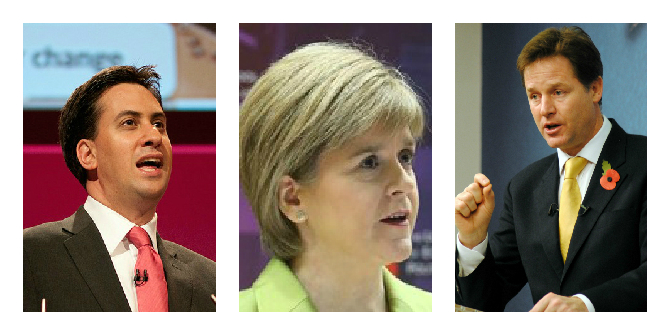
 Drawing on recent research about UK think tanks, austerity and social policy, Hartwig Pautz and Elke Heins examine the relationship between government and the world of ‘independent expertise’. Focusing on one example, the Centre for Social Justice’s influence over Conservative ministers’ social policies, they find that some relationships are often very close. The public commentary provided by non-independent think tanks has become increasingly problematic, with print and broadcast media often re-presenting their views devoid of any recognition of strong partisan ties.
Drawing on recent research about UK think tanks, austerity and social policy, Hartwig Pautz and Elke Heins examine the relationship between government and the world of ‘independent expertise’. Focusing on one example, the Centre for Social Justice’s influence over Conservative ministers’ social policies, they find that some relationships are often very close. The public commentary provided by non-independent think tanks has become increasingly problematic, with print and broadcast media often re-presenting their views devoid of any recognition of strong partisan ties.
Independent expertise from organisations and individuals outside of government has always been a factor in the politics and policies of the welfare state, but even more so since the turn to ‘evidence-based policy-making’ in the late 1990s. Supposedly modern policy-making is not steered by ideology or partisan interests, but simply and plainly by ‘what works’. But this raises important question about the source and origin of much evidence and expertise. Think tanks are among the political actors which have gained a prominent role in this context. Their position in the policy process has raised a number of issues, some of which are illustrated here with the example of the Centre for Social Justice (CSJ), which says it is an ‘independent’ social policy think tank on the centre-right of British politics.
CSJ does not belong to the ‘old guard’ of right-wing, conservative or libertarian think tanks such as the Institute of Economic Affairs, the Adam Smith Institute or the Centre for Policy Studies. Along with other think-tanks founded in the early 2000s such as Civitas, Policy Exchange, Reform and ResPublica, CSJ helped the Conservative Party under David Cameron to ‘modernise’ by adopting what has been described as ‘a post-Thatcherite style of liberal Conservatism’.
CSJ is a prime example of a think tank that has functioned as a ‘rehabilitation centre’ for a failed politician. Iain Duncan Smith, now Secretary of State for Work and Pensions, founded CSJ in 2004 to restart his career after being ousted as leader of the Conservative Party. But CSJ is also a showcase for the remarkable revolving-door system that now operates between public and private office, and how think tanks now provide career stepping stones for those with political aspirations. In August 2015, CSJ’s director Christian Guy moved to 10 Downing Street as special advisor to David Cameron. He replaced Philippa Stroud, now made Baroness Stroud, who has returned to CSJ as Executive Director.
Think tanks – revolving doors between public and private office? (credit: Alexander Mueller CC BY 2.0)
The Centre was crucial for kick-starting the Tories’ rethinking of their social policy agenda. Two reports from 2006 and 2007 – ‘Breakdown Britain’ and ‘Breakthrough Britain’ – were of particular significance. With them CSJ helped to fill the gaps in the Conservatives’ social policy portfolio, allowing David Cameron to present his party’s ‘compassionate’ face, while helping him to establish a powerful discourse about ‘broken Britain’. A number of perspectives on problems, along with concrete policy proposals from these reports, were officially adopted by the Conservatives before the 2010 elections. For example, the Tories accepted the concepts of ‘relative poverty’ and ‘social exclusion’ as a basis of policy development. In particular, as a leading CSJ staffer said, the Centre helped shift the focus about the causes of poverty ‘from money to poor schools, family, dependency, debt, addiction’.
CSJ not only decried Britain as broken and blamed New Labour’s welfare state for it, it also invested heavily into the development of specific ideas for changing the welfare state. Outstanding here was its work on what would later become Universal Credit, under Duncan Smith in office. For the sophisticated preparatory work for the new benefit system CSJ found generous sponsors in the management consultants Oliver Wyman. They offered financial as well as staffing and intellectual support through secondments to CSJ.
This backing enabled CSJ to develop proper micro-simulation models ‘which previously only the Treasury and the IFS could do […] It was pretty rigorous stuff, an exception to the rule that think tanks can’t really offer that kind of work to government’ (unpublished interview, Pautz 2014). Stephen Brien, who had been seconded from Wyman to CSJ, was brought into the Department for Work and Pensions in 2011 to help deliver the programme. However, the relationship later grew sour over massive problems in the implementation of the Universal Credit programme, which Duncan Smith blamed on his officials. Brien left government in 2013 – to join CSJ.
Arguably, much of the compassionate veneer which CSJ and other think tanks developed for the Tories in the 2000s has worn off. The global financial crisis and recession seemed to many Conservatives to require subordinating compassion to the supposedly inevitable need for financial austerity – although the Chancellor of the Exchequer reassured the British public ‘that we are all in this together’. The Spectator speculated that Philippa Stroud had to leave Downing Street because she was too keen on working with troubled families and drug addicts, for a government pushing for further welfare cuts.
Partisan think tanks as media ‘commentators’
Think tanks have supported this change of discourse and policy with expertise and public commentary. Such commentary – be it published on think tanks’ own websites, on blogs, or via social, electronic and print media – continues to be something of a blind spot for critical analysts of the think tank world. In particular, the supply-demand relationships between think tanks and journalists and editors, and how both engage in symbiotic exchange, merits more analysis.
What is clear to any listener of programmes such as Radio 4’s Today is that interviewees from think-tanks are rarely introduced as who they are. Instead they are usually presented to listeners as objective and impartial organisations, seeking to improve an irrational and partisan political debate with evidence and expertise. A recent Radio 4 interview with Baroness Stroud on the topic of tax credits is a good example of a think tank representative about whose background listeners were entirely left in the dark. On this occasion she argued against Osborne’s proposed changes due to their impact on the ongoing benefit system changes (the transition to Universal Credit). On another occasion, on the same programme, the director of the Institute for Economic Affairs made the case at length against plain packaging of tobacco products. The BBC’s top radio journalists failed to introduce him as heading an organisation reported to be benefiting from tobacco companies’ sponsorship. Print journalists are no more conscientious and diligent, as think-tanks’ publications are often cited without giving their readers the opportunity to understand the report within the context of its making.
Finally, think-tanks have now started to produce TV documentaries. In 2014, Channel Four produced an entire episode of its Dispatches series on the basis of data prepared by CSJ and edited by Fraser Nelson – who not only edits The Spectator but is also on the advisory boards of the CSJ and Centre for Policy Studies. Not surprisingly, the episode found that ‘poverty is about far more than just money’ and that in particular ‘family breakdown’ was a cause for poverty – a message conveniently echoing CSJ’s and Duncan Smith’s convictions about ‘broken Britain’.
Think tanks should remain an important object of critical scrutiny because knowledge, expertise and evidence continue to be key elements in the armoury and weaponry in politics and policy-making. This is particularly the case in social policy, where the oft-proclaimed necessity for austerity and deep changes to the workings of the British welfare state have been argued for on the basis of evidence from sources that are far from objective, impartial or all about ‘what works’. The context of crisis, welfare state change, and wider public spending cuts should provide critical observers with sufficient material to ask how ‘independent’ expert organisations that have influenced government are actually run – and how they have furthered a discourse that austerity is ‘without alternative’.
___
Note: This article gives the views of the authors, and not the position of the British Politics and Policy blog, nor of the London School of Economics. Please read our comments policy before posting.
 Hartwig Pautz is Lecturer in Social Sciences in the School of Media, Culture and Society, University of the West of Scotland. His recent publications on think tanks includes the journal article ‘The Think-tanks behind Cameronism’ and book Think Tanks, Social Democracy and Social Policy.
Hartwig Pautz is Lecturer in Social Sciences in the School of Media, Culture and Society, University of the West of Scotland. His recent publications on think tanks includes the journal article ‘The Think-tanks behind Cameronism’ and book Think Tanks, Social Democracy and Social Policy.
 Elke Heins is Lecturer in Social Policy in the School of Social and Political Science, University of Edinburgh . Her recent articles include “’Best of both worlds’? A comparison of third sector providers in health care and welfare-to-work markets in Britain” (with H. Bennett) and also “A new era of European integration? Governance of Labour market and social policy since the sovereign debt crisis” (with C. de la Porte).
Elke Heins is Lecturer in Social Policy in the School of Social and Political Science, University of Edinburgh . Her recent articles include “’Best of both worlds’? A comparison of third sector providers in health care and welfare-to-work markets in Britain” (with H. Bennett) and also “A new era of European integration? Governance of Labour market and social policy since the sovereign debt crisis” (with C. de la Porte).









Many thanks for this article, I have been trying to express something along these lines for ages but have not been able to do so. I believe these think tanks owe much to the world of marketing and advertising and little to the world of rigorous research.
After reading this I took the time to look up the most recent articles of both authors.
“A new era of European Integration?… ” co-authored by Elke Heins is $43.
“British Think-Tanks and Their Collaborative and Communicative Networks” authored by Hartwig Pautz is $38.
So while much of this analysis seems correct, it does seem to omit the fault of academia over many decades to conduct their work into the open. For as long as the public cannot engage with academics they will, and indeed should, continue to seek insights from other sources including think tanks.
Hi Thomas,
I agree with your point about access – part of the reason for LSE blogs is to get research out there for free so the public have another source of information. But unfortunately many journals and publishers still charge. There are free-to-join services (such as Researchgate) where academics upload research, and you can try contacting academics to see if they can provide you with a copy of an article (although this is occasionally restricted by the publishing contract).
Things are moving in the right direction – just very slowly! There are more articles about this over at LSE Impact blog if you want more information.
Hope this helps, Luke (co-editor)
Fine way of explaining, and pleasant article to get
facts on the topic of my presentation subject matter,
which i am going to deliver in school.
Whenever I see research results being propagated by different bodies, I question just who benefits from their findings but this usually becomes even more apparent when we instead ask the question “Who pays?”
Whether it is pharmaceutical companies or other vested interests, it becomes apparent that professionally disinterested research results become ever less achievable by the day.
All the more reason to welcome research sponsored by bodies like the ESRC.
Yeah…you have America to thank for that. Starting in the 70s Conservatives thought the think tanks, which originally were were conceived as open universities during the progressive era, were too liberal so they hired their own guns and set up a large assortment of think tanks to actively promote conservative corporate friendly ideas. These were funded by millionaires like the Koch Brothers. Sadly congressional research staffs have been reduced to nothing and congress gets constant bombardment by corporate lobbyists and their think tanks, ergo the wide dissemination of erroneous concepts like: all calories are the same, fracking is not so bad and austerity works. Whenever I hear a think tank pundit I check the mission statement of his aquarium and if the mission mentions “freedom” and “market solutions” it is a mouthpiece for neoliberal drivel.
Yet another highly regrettable import from the Washington DC belt-way.